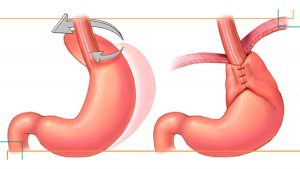"Bariatric surgery surgical -Intervention indicated for severe cases of obesity- It is not magic, and after the operation, the patient must continue to make an effort on their part, strictly following the guidelines given ", CuídatePlus Rocío affirms Basanta, clinical psychologist responsible for the program and liaison of the Hospital Universitario Lucus Augusti (HULA), Lugo. The expert participated last week in the First Day of Psychology Treatment of Obesity, held in Barcelona, with the protection of the Spanish Society for Study of Obesity (sinews) and the College of Psychologists of Catalonia (COPC).
Basanta stresses that psychologically preparing the patient before, during and after operation will get better results and more efficiently. For this reason, "We must take care of the process and carefully choose when entering the operating room; that it is a time of stability. And at that time it is important to prepare and accompany ".
Recalling that bariatric surgery aims (through various techniques) the patient, morbidly obese patient, lose weight significantly and maintained over time, the rapporteur of one of the workshops on this day, Antonio Alcantara, clinical psychologist and professor at the University of Lleida, explains who is the recipient of this therapeutic modality.
psychologically, Are all patients are candidates?
Clearly, no. Basanta clarifies the following: "Not all people with obesity are candidates for bariatric surgery. The first selection make endocrinologists among patients with severe obesities and who have spent years with the problem ". But also, and that's part of clinical psychologists, "We must ensure that they understand what the operation and the whole process, and to engage and collaborate with health care, starting and before surgery, and is at the right time. If the person is not psychologically prepared operates, or is not the right time to intervene surgically, there is more risk of failure in evolution, Although surgery has left perfect ".
Alcantara mentions that there is some consensus in the evaluation of candidates, pointing to some mental disorders such as major shareholders have achieved this height and weight ratio corresponding to the category of morbid obesity as a disease -Obesity itself and is usually accompanied by other patologías-. These mental illnesses are present at the time of the interview or anticipate that will accompany you in the near future.
The expert indicates that regarding the psychological, in the case of a person with unstable personality, in the mood, addictions, or disordered eating behavior, persistently and with sufficient intensity, is in the genesis of the problem, it has to exclude the patient from the protocol and offer the possibility to repair the table has generated this result. That is to say, detection of disease during the evaluation is key, because if the candidate conceals or omits information during interviews and tests, you risk a failure more than likely. In some cases, exclusion is temporary and after making appropriate therapy, the same patient is able to cope with more guarantees this change. In others, if the desire to "surgical solution" is superior to honesty in the evaluation process, the remedy will be worse than the disease. "The psychologists, many times, we have only the information that reports the patient and this may be tempted to present the narrative that most consider that suits you. The grasp the contradictions and incongruities is the task of the evaluator, but we all know that there are people who have a master in getting what they want, without stopping to think if what suits them ".
How should the psychological preparation for this surgery?
"The candidate must be knowledgeable and that is the task of the entire multidisciplinary team, that is to say, endocrine, Nutritionists, Cardiologists, neumólogos, psychologists, and others that may be adding, as experts culinary and physical activity. He will have surgery and be kept aware of the need to adapt to the new situation to be presented after the operation ", tells Alcantara.
This expert notes that surgery is intended to help those who can not get through the recommended diet with changing habits. It is surgery, despite developments in the intervention techniques, it must be regarded as aggressive, because it affects the stomach, called by many the "second brain" and be reduced irreversibly, as well as a section of the intestine, if the technique chosen by the surgeon is known bypass. It should not be a decision made impulsively and capricious, since alter eating habits and digestive function. For all this, you have to work at par, both information and expectations.
What feelings may appear after the operation?
About feelings that can pass through the head of the patient after the operation of bariatric surgery, Alcantara said to be changing according the stage located and depending on whether or not match expected.
At first, the patient may feel relief, by passing an intervention, let's not forget, It has its risks, and considering the complexity of operating a person who, As minimum, I have an affected cardiorespiratory system for overexertion maintained for years.
A getting out of the hospital, after about a week, You will have some vertigo; It is not neurological vertigo, but the feeling of being given a jump to a step unknown, as one who embarks on a journey with risks and fears, excitedly.
Later, in the following months, you will see how to lose weight and body image changes at a pace which must be adjusted, as, if too fast, They may have the feeling of anguish, fear and lack of control. However, If the weight reduction is gradual and the person adapts to its new form, the feeling is satisfied with herself. Maybe some self-criticism appears not to have it done before, but, If you have no tendency to judge wrong, and it will fade just as condemned, was also pardon.
There will come a time when you have to accept his "new clothes", with all its "seams", and that takes time, because body image is one of the foundations of our identity and affects us both individually and in couples, family and other social environment. An example: you ask a family who are you? because a year ago that does not see you and do not recognize can be anything from comic to tragic, according to the scene and actors.
Recalls Basanta, after the operation, once discharged, Physically there are few changes, but our diet has changed completely. For many weeks we have to follow strict medical indications, and the principle based only eat liquids, in small quantities and several times a day. If we was difficult to follow before signs, so it will be after the operation, so the sooner we start better, because changing habits is very complicated.
"The feelings that usually appear are related to the fear that the process does not have the expected results; impatience with the slow she becomes; frustration because things are not as we had imagined; and believe we can do many exceptions in food and that's not going to have consequences, but the truth is that it has ", clinical psychologist lists. It is important to be careful with deceptions.
Are there any mental disorders resulting from the change in weight and appearance?
Basanta says that there are emotional problems that appear or worsen after a drastic makeover. "From Psychopathology more expectable, as symptoms of anxiety and depression, but also more serious and disturbing problems that require more care and study on our part. In fact, It is beginning to see a significant increase in self-harm and suicide attempts in people who have been operated. That makes preparing for change is key to good performance, and we are experts in this clinical psychologists. That is also very important to increase the number of professionals working in this field and we have time to spend with patients ".
On the one hand, Alcantara says, "Care is to be maintained by both the psychiatrist and other specialists with adjusting medication that the patient was previously taking, since the spaces are altered where catches in the first instance medication and many medications are weight-dependent. Postsurgical poor control may involve alterations from a viewpoint chemical and pharmacological, consequently, descompensar to the patient ".
Moreover, psychologically, and this time linked to the change, find the disorders we call "adaptive", since the new situation in some parameter does not match the desired. Precisely for this reason, stresses Alcantara, "We must work both information and expectations before surgery, since the pathology of adaptation, be anxious, depressive or behavioral, come from the hand of frustration, which it is the difference between anticipated and reality. Surgery is not like getting a tattoo, but it affects the whole person. If for a tattoo you have to think twice, further to an intervention that will alter more than the image and, also, you can not hide ".
By last, Professor at the University of Lleida notes that change often makes them stronger and others, most vulnerable, It all depends on whether obesity had some use in your life, whether it was a "functional obesity".
Since Beware Plus



